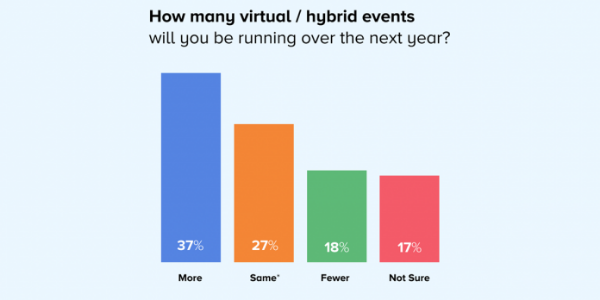
Less than a fifth of events industry practitioners expect hybrid and digital events to reduce in prevalence in the coming year, despite the fact that attendance at in-person conferences and exhibitions is returning to pre-Covid levels. They point to a combination of inclusivity, seamlessness and sustainability as reasons why hybrid will hold its ground.
Totem, an event-tech company, interviewed delegates at International Confex at London’s ExCeL, and found that 37% expect to work on even more virtual and hybrid events in 2022 than in previous years. Meanwhile, 27% expect to see the same amount as the last 12 months, and only 18% expect to see fewer.
When interviewees were asked about the most important feature of a virtual or hybrid event, 53% cited networking opportunities. This was followed by data at 19%, and on-demand content at 9%.
Alex Hughes, Co-founder, Totem, said: “What we’re hearing from the industry is that while we’re going to see a major push back to in-person events in the coming months, digital transformation continues apace. Hybrid plays an important supporting role in ensuring that organisers, sponsors and attendees have more ways to be event happy in 2022.”
Interviewees were asked to give their reasons why hybrid will continue to play an important role in 2022 and beyond. Responses included increased inclusivity and affordability for international teams, alongside improved time management and comfort levels.
Victoria Logan, Director of Marketing and Education, British Society for Rheumatology, commented: “One of the reasons people attend conferences as medical professionals, is that they have to keep up to date with what’s going on with research. While some people love attending these events, others don’t want to go to Glasgow for five days, but they still want to get the information. So, I think virtual will always be an attractive option for them.”
Interviewees suggested that, for event organisers, hybrid offers opportunities to engage attendees in myriad different ways – and many are getting increasingly creative with that scope. They also noted that hybrid allows organisers to hold more sustainable events, while adding a Plan B, in case something unforeseen happens on the big day.
Sarah Williams, Head of Events, Faversham House, commented: “Over the last two years we went from physical to digital and found a new audience through that digital experience. As we’ve come back to physical, we have put on several hybrid opportunities. What we found is that most people want to come in real life, but we can also offer some content digitally. So, you might buy a ticket to a physical conference, and then also have the opportunity to attend a digital webinar or a specialist roundtable as part of that overall ticket. So, it’s really just blending all those things together.”
Totem gained the insights from events experts who attended its stand at International Confex on 8-9 March 2022. The full findings are here:
How many virtual / hybrid events will you be running over the next year?
Fewer: 18%
More: 37%
Not sure: 17%
The same as the last 12 months: 27%
What is the most important feature of a virtual or hybrid event?
Data: 19%
Networking: 53%
On demand: 9%
Other: 19%

![Latest Cvent Planner Sourcing Report Reveals Anticipated 2025 In-person Event Growth Comes with Increased AI Adoption and Higher Expectations for Faster, More Customised Hotel Responses CVENT_600x300[1]](https://eventsbase.co.uk/wp-content/uploads/2024/11/CVENT_600x3001.png)
![Association Meetings Continue to Embrace Values of Meeting of the Future Meeting_of_the_Future_(600×300)[1]](https://eventsbase.co.uk/wp-content/uploads/2023/10/Meeting_of_the_Future_600x3001.png)
![ABPCO Celebrates a Year of Growth and Success ABPCO_(600×300)[1]](https://eventsbase.co.uk/wp-content/uploads/2024/01/ABPCO_600x3001.png)
